The 9 best yoga mats for finding your flow at home or in the gym
We've reviewed the very best yoga mats on the market to help you find your inner zen, stretch, or meditate
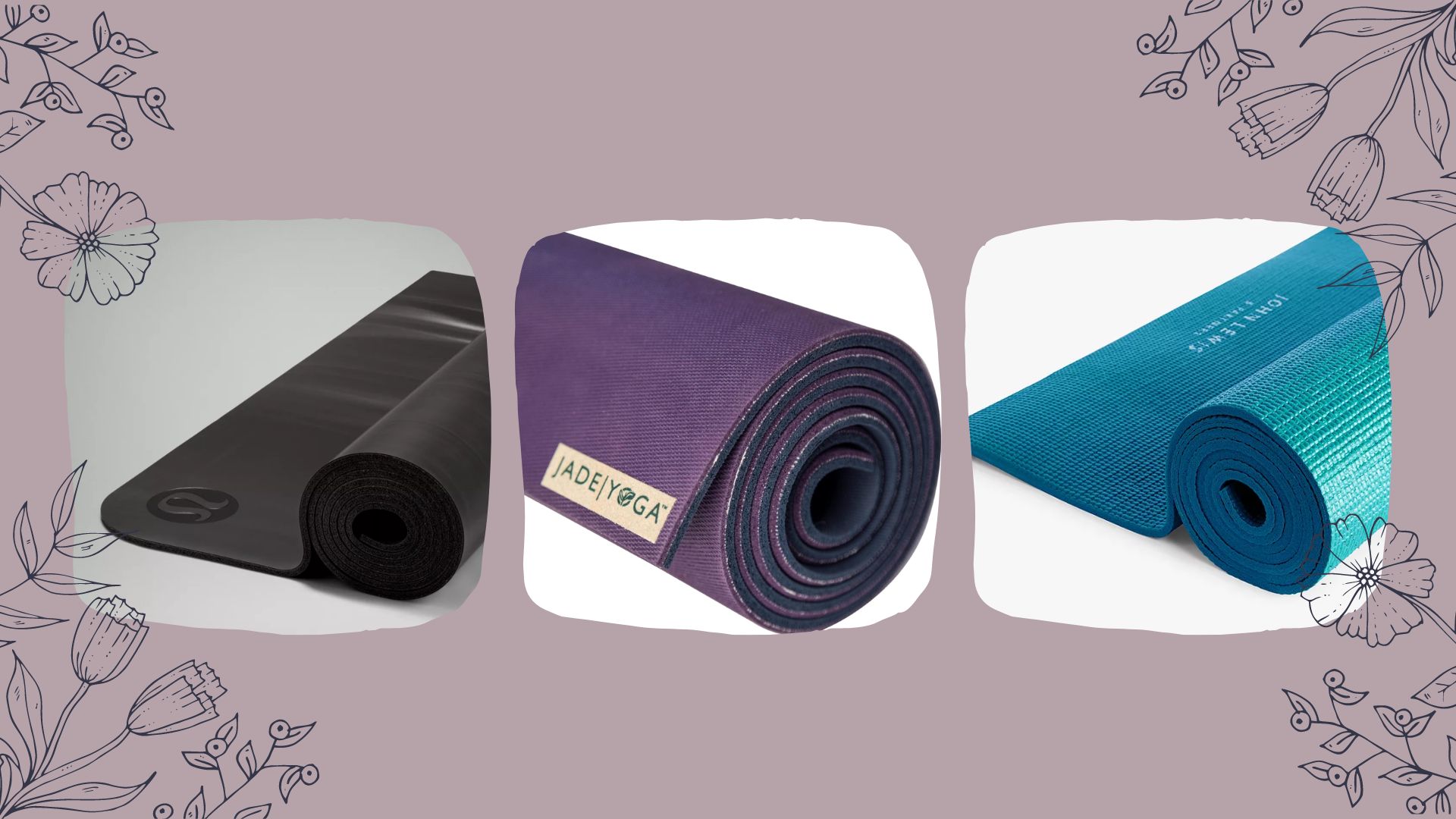

Looking to buy one of the best yoga mats? Whether you've recently taken up classes or want to stretch out at the end of a run, a mat like this can make a real difference. And with great buys from the likes of Sweaty Betty, Yogamatters, and Lululemon to consider, there's certainly something for everyone in our round-up.
But while there are plenty of yoga mats on the market to choose from at these brands and more, some will be more suitable for your needs than others. For example, those who are a little taller will have different requirements to those of average height. Fans of intense yoga and Pilates poses will likely favor cushioning and stability above all else, while beginners won't need something quite as complex.
Whatever type of yoga mat you're looking for though - from the best thick yoga mats to beginners' mats - we've got you covered with our tried and tested guide. We've also consulted the experts to determine what makes a truly good mat and the features best avoided.
The best yoga mats as chosen by the w&h team
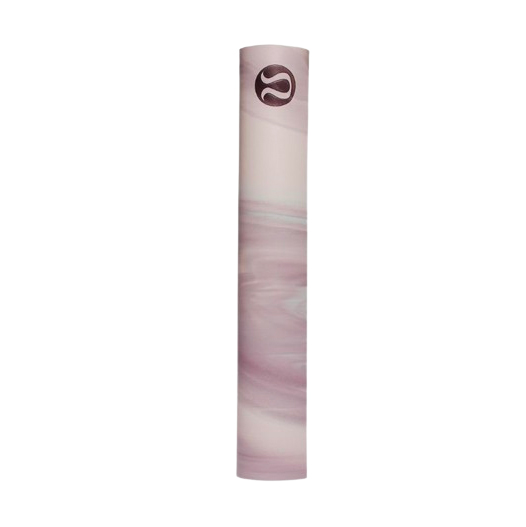
RRP: £58 | Thickness: 3mm
Lululemon can do it all. From activewear to yoga mats, they have what you need when it comes to quality fitness purchases. Regardless of which type of yoga you want to practice, from meditative classes to pilates, this mat ticks all the boxes and then some. And it certainly performs when it comes to grip too, our tester found. It's also slightly wider than standard mats on the market as well, so you feel like you have plenty of room to move.
Buy it if: you want the best-in-class yoga mat for any occasion.
Don't buy it if: you'd rather stay away from latex.
Our Lululemon The Reversible Mat 3mm review has the full details.
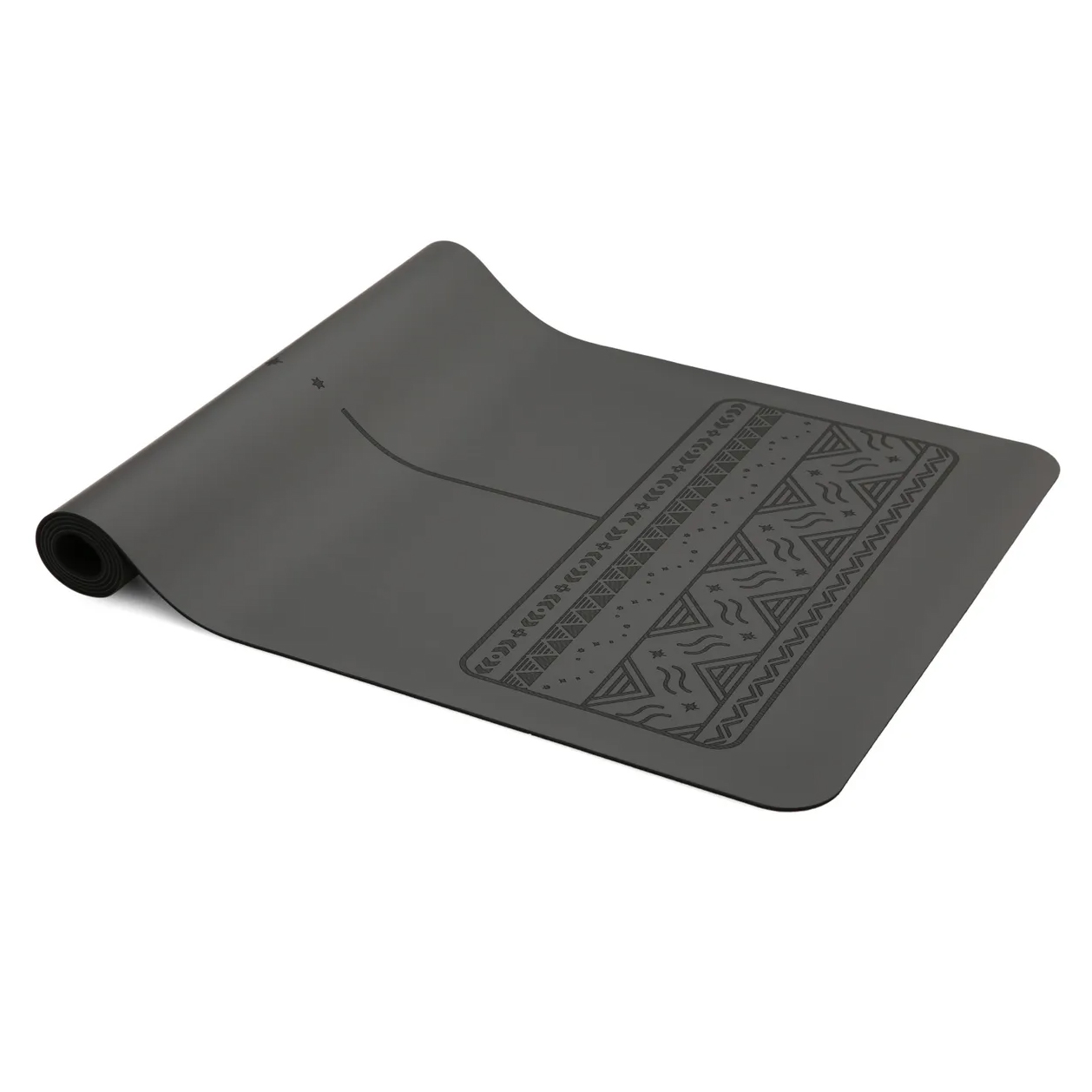
RRP: £74.95| Thickness: 4mm
When most yoga mats get wet, they also get super slippery. But, that’s not the case for this Yogi Bare mat, our tester found. "I love hot yoga and I'm always skeptical about testing out new mats as some of them really don't fair well under sweaty conditions. But this one was great! While it did feel wet by the end of my session, I only really noticed when I picked it up out of the studio as I didn't slip and slide around during the session at all," she says. Sounds good to us!
Buy it if: you prefer hot yoga.
Don't buy it if: you need a thinner mat.
Our Yogi Bare Paws Natural Rubber Extreme Grip review has the full details.
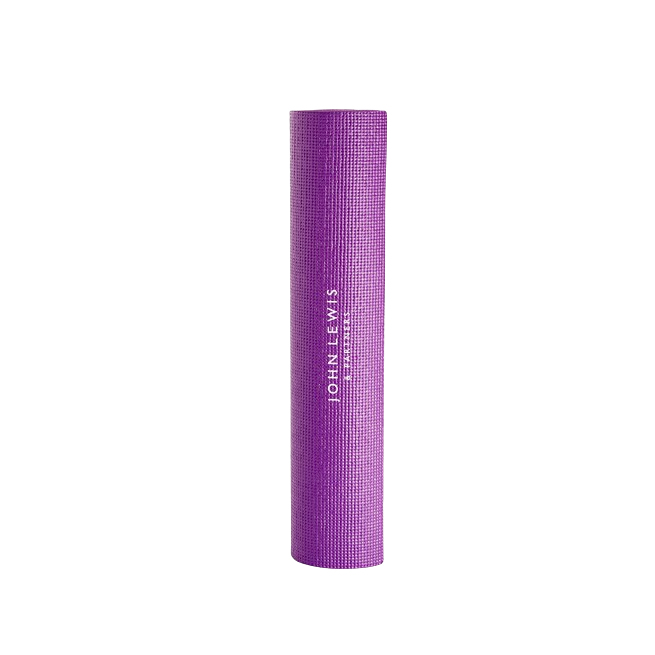
RRP: £20 | Thickness: 6mm
While the Lululemon and Yogi Bare mats are excellent buys, they are real investments into the practice and best suited for those who regularly practice yoga. But what you're likely to spend on a yoga mat will probably depend on how often you do yoga and your budget for the product. If want to buy an excellent starter mat on a budget, try this one from John Lewis. It's cheap and cheerful, and pretty good quality for what it is.
Buy it if: you're on a strict budget of £20.
Don't buy it if: you're looking to upgrade your mat.
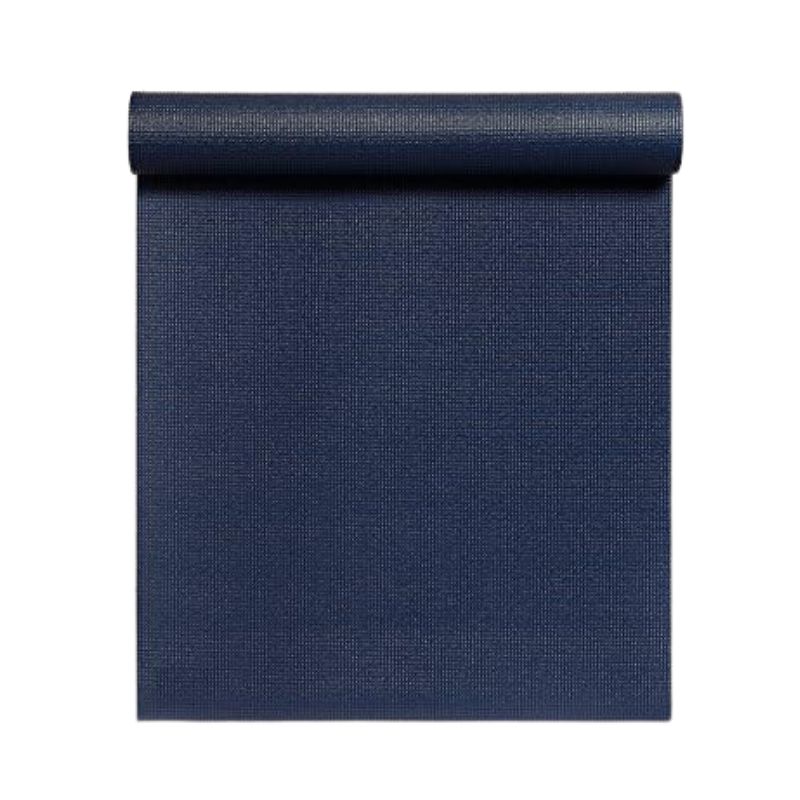
RRP: £27.00 | Thickness: 4.5mm
This extremely affordable mat is also latex-free, making it suitable for anyone looking to avoid using latex-based materials in their fitness equipment. Importantly, it's made from high-grade PVC so it's easy to clean. There are 14 different shades to choose from, so if you want to start your workout with a pop of colour, this could also be the best yoga mat for you. While it doesn't come with a yoga strap, it's easy to carry too.
Buy it if: you're on a budget and want to avoid latex.
Don't buy it if: you want a mat for hot yoga – it's slippery when wet!
Our Yogamatters Sticky Yoga Mat review has the full details.
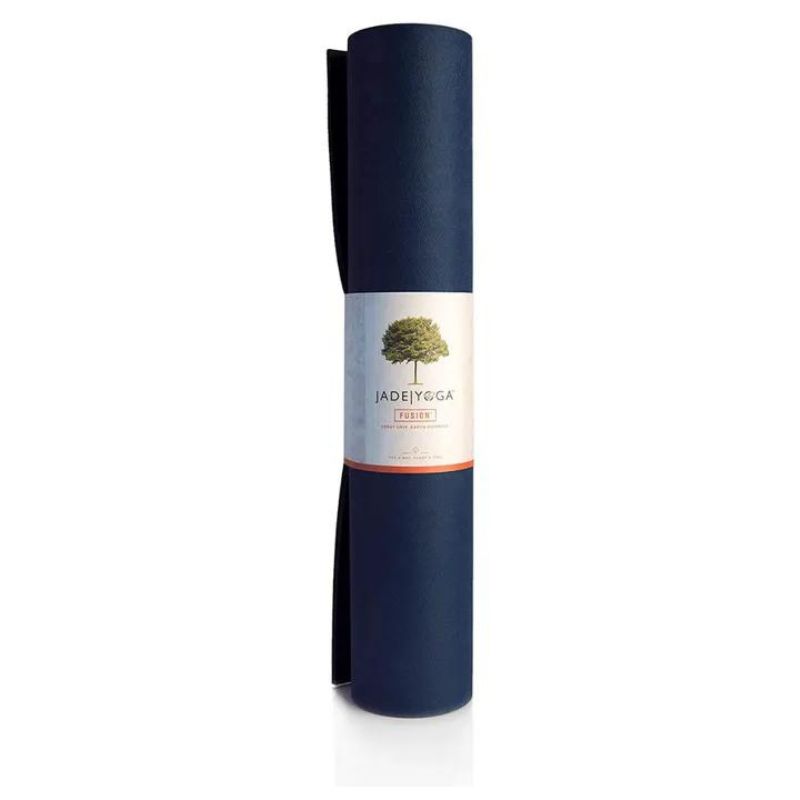
RRP: £120.95 | Thickness: 8mm
At 8mm thick, this yoga mat feels indulgently soft and squidgy - making the likes of child's pose and Shavasana even more of a restful treat and allowing you to enjoy all the benefits of yoga in full comfort. "This is hands-down the most comfortable yoga mat I've ever used," our tester said. "It's so bouncy and soft. When you're lying down on it, it almost feels like you're resting on a cloud.' We wouldn't recommend it for more energetic exercises because it can make certain moves slightly more of a challenge to balance in. But it's rather a small price to pay if you're looking for support.
Buy it if: you want comfortable luxury to practice yoga at home.
Don't buy it if: you're on a tight budget.
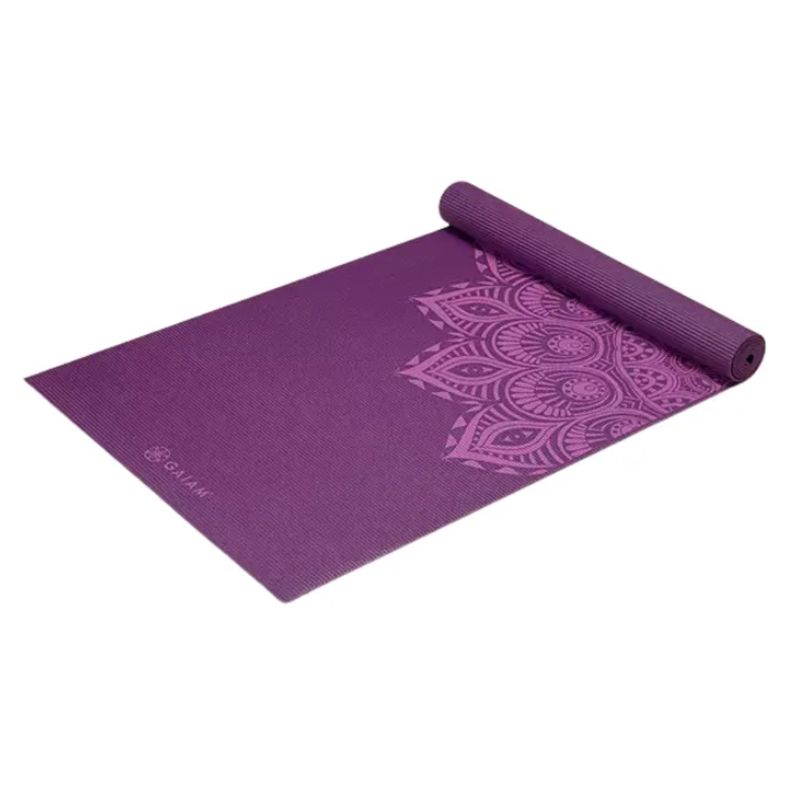
RRP: £30.49 | Thickness: 6mm
Looking for something both squishy and stylish? Gaiam really delivers on comfort and this thick yoga mat from their Premium range is no exception. While all of the yoga mats on our list have good support with at least 3mm of thickness, some people may want something with a couple more millimetres of support. This one has an impressive 6mm of thickness to offer while only being 1.34kg making it perfect for travel too.
Buy it if: you want a cushioning mat.
Don't buy it if: you're going to be doing more intensive aerobic sessions.
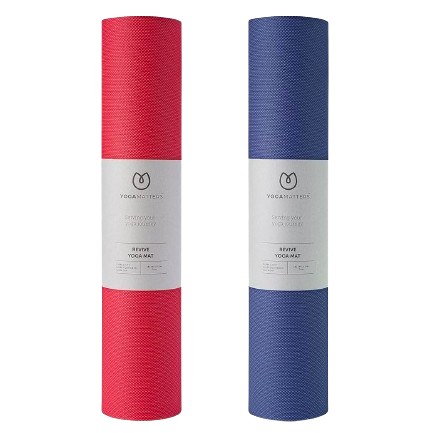
RRP: £45 | Thickness: 5mm
In the market for a mat to use for all of your workouts? Or something to use at home with a pick of the best yoga apps? Let us introduce you to the Yogamatters Revive Yoga Mat. Designed specifically to suit all activities, whether you're a seasoned yogi or trying Pilates for the first time, this mat will see you through any exercise. It's also sweat-proof, so the perfect versatile buy for hot yoga too.
Buy it if: you want a mat to use for all of your workouts.
Don't buy it if: you're looking to save ££ on your purchase.
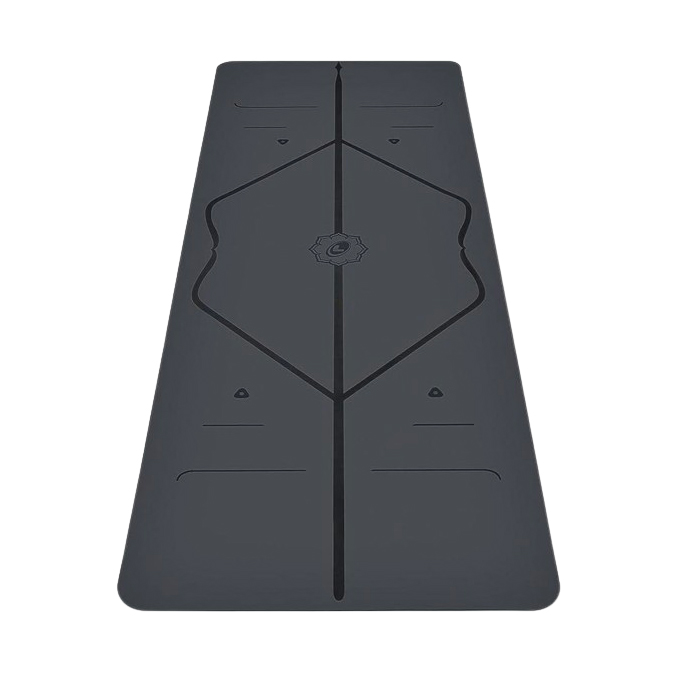
RRP: £115.00 | Thickness: 4mm
This premium mat is impressively grippy, with the same marking systems that make the YogiBare mat great too. It might be the most expensive pick on the list, but it is worth considering if you need the kind of grip that comes along with being an experienced yogi. It made a difference to our tester's comfort too, with a thickness that was comforting without being too deep.
Buy it if: you want top-notch luxury quality for your money.
Don't buy it if: you want to spend less than £100!
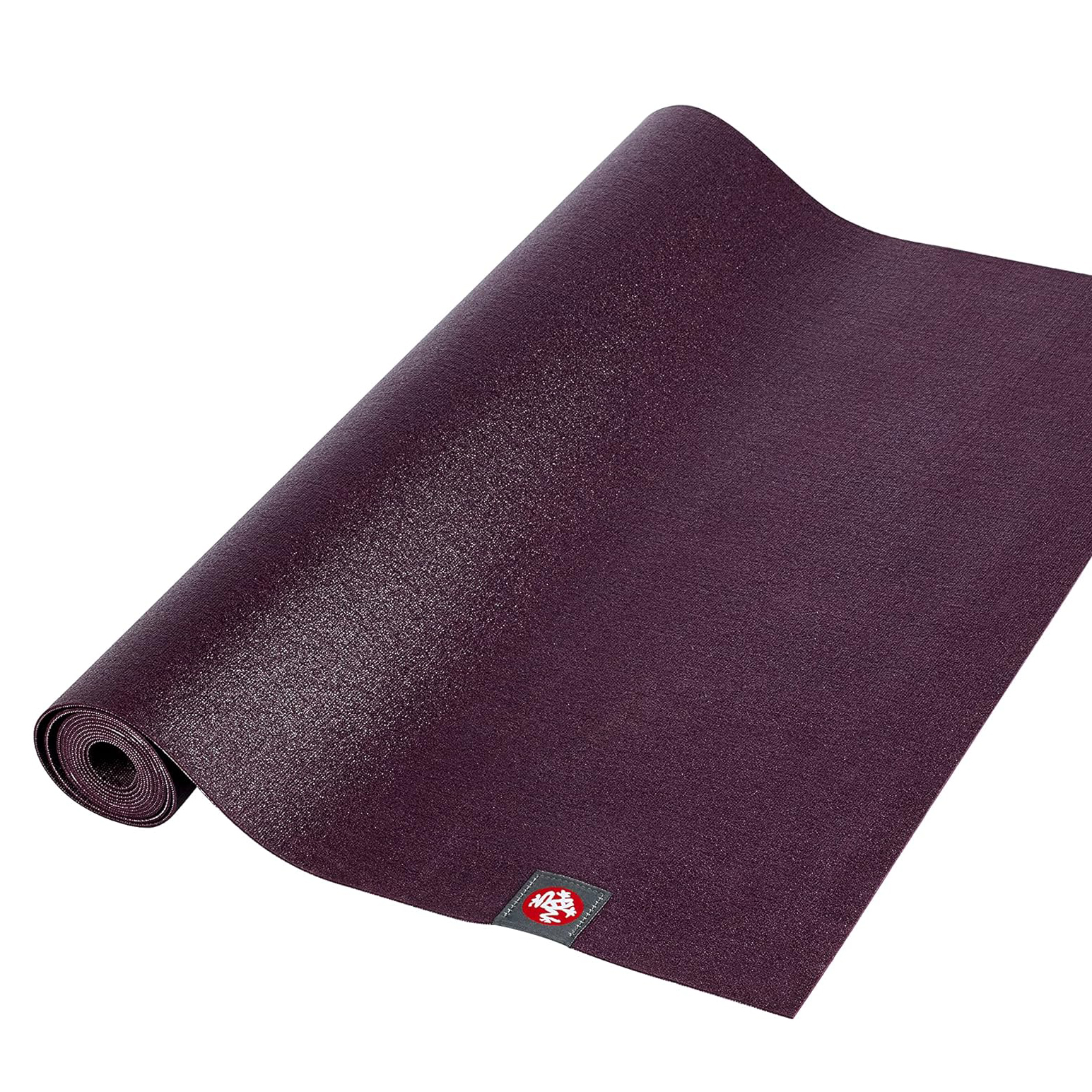
RRP: £50.00 | Thickness: 1.5mm
This is the mat to opt for if you've just joined a yoga studio and want something that's going to help you enjoy your practice more whilst being practical to carry. With a thickness of 1.5mm, it's non-absorbent but also naturally grippy. It's also available in a selection of fab, earthy colours. Pair it with a travel strap and you'll be good to head off to your next class!
Buy it if: you need a mat for on the go.
Don't buy it if: you need a thicker mat for stability and comfort.
How we chose the best yoga mats
After consulting the experts on what goes into a great yoga mat, we gathered a range of different ones in all kinds of shapes, sizes, colours, and materials to test them out for ourselves. The health team at woman&home put each mat to the test during a range of activities from yoga mat workouts like power yoga and Vinyasa, to meditation and home workouts. Then we decided on the most important factors to consider:
- Material: Natural rubber is antimicrobial and cork is eco-friendly, while PVC is affordable and easy to clean. So ultimately, this is down to personal choice, with each option having particular benefits. We tested a range of different materials to provide insights on all the best ones.
- Grip: A mat with a great grip on both sides is a must-have to avoid any nasty slips as you flow. Options with a non-slip coating or those that are made from materials like rubber are best, we found.
- Support: Most yoga mats will be thick enough to offer support for your joints but we noted the thickness of each mat and how it made a difference. If you want extra support for joints, choose one of the thicker mats with extra cushioning for ultimate comfort.
- Design: Is a brightly coloured mat important to you? Or do you enjoy an alfresco flow and need a yoga mat that comes with a helpful carrying strap? There are so many designs on the market, and the right one will help bring out your inner zen, so we tested a range to decide on the best.
- Size: If you plan to use your yoga mat for HIIT workouts too, it's worth opting for a slightly larger size than the standard yoga mat. As members of the woman&home health team are all different heights, we were able to test a variety of different sized mats - following expert advice that a yoga mat should be taller than us by around 7 inches.
FAQs
What should I look for in a yoga mat?
When figuring out how to choose a yoga mat you like, consider what level of grip you want: "Don't assume that the most popular yoga mat brand is right for you just because it's popular," warns Cat Meffan, a certified yoga instructor and founder of the Soul Sanctuary. "There are different types of grip, all of which have a slightly different lifespan. The smooth recycled rubber mats that we see everywhere (e.g. Lululemon) are amazingly grippy at the start, but on average they will last for around 300 - 400 practices. If you're someone that does yoga every day, this might feel a little excessive to be buying a new mat each year. Or you could feel the opposite and know that a good mat is helpful to your asana growth."
Think about what materials will work best for you: "Some materials like cork or a soft velvety texture are great, but more so for hot yoga classes or very dynamic flows when you know you'll get sweaty. When buying a "yoga towel" or hot yoga mat, be aware that these are often only 1 - 2mm thick, so you'll want to have another mat to pad underneath. Something else to look out for is brands that don't have any latex or PVC in their mats - many people have allergies to these, so it's worth finding a mat without them," she says.
Weigh up thickness vs weight: "Thickness matters, especially if you like extra padding under the knees and spine," says Meffan. "But bear in mind that the thicker the mat, the heavier it will be. 6mm mats are rather common now, as are longer and wider mats. These are all great for home practice but if you like to travel with your mat, or you have to walk to your local yoga class, it might be a little too much."
Consider whether you want an alignment cue: "Many yoga mats now have alignment cues (including those on our list) and those these can be helpful, especially that center line, I don't believe that they are crucial in a mat," she says. "We have to remember that all bodies are different, so the standard alignment markings on a mat may not work for you and may therefore just get in the way of your practice."
Consider whether it's sustainable and the company's values: "We have so many choices in yoga mats now, so if you find yourself in a privileged position to be able to think about this point when purchasing a mat, then that's brilliant," says Meffan. "The yoga industry is said to be worth around £74bn globally, which equates to a lot of people profiting from this beautiful ancient practice. There's nothing wrong with that, but these yoga brands must be honouring the roots of yoga and giving back into the community, rather than just being all about profit."
Is there a difference between a yoga mat and a fitness mat?
The short answer is yes. "The differences between yoga mats and exercise mats are the thickness and firmness of the material," says yoga instructor Thimela Garcia, yoga instructor and founder of Chakra Mama Healing. "Yoga mats need to provide support and some cushioning, but they should also allow you to feel stable and grounded when performing poses."
Similarly, Caroline Lucas, yoga instructor and owner of Karma Studios, adds, "A yoga mat generally has better grip. No one wants to be slipping around in downward facing dog."
In contrast, Garcia explains, "Exercise mats are mostly thicker than yoga mats because they need to be relatively firm to provide some level of padding for dropping barbells, kettlebells and weights." In addition to being designed for impact-heavy movement, including to withstand intense HIIT workouts and strength training with weights, "fitness mats tend to be designed so that the user doesn't feel the ground as closely."
What is the best thickness for a yoga mat?
The same goes for the thickness of the yoga mat. "The thickness and quality of your mat makes a big difference too," personal trainer and yoga specialist Kira Mahal, who also founded MotivatePT, says. "4mm are thinner and ideal for balance poses, while thicker 8mm mats are too thick to balance on but great for laying on. A 6mm mat provides enough support for the back when lying down, whilst also being able to do balance postures when standing, so that’s a good place to start."
Our experts
Cat Meffan is a certified yoga instructor and founder of the Soul Sanctuary.
Thimela Garcia is a yoga instructor and founder of Chakra Mama Healing.
Caroline Lucas, yoga instructor and owner of Karma Studios.
Sign up for the woman&home newsletter
Sign up to our free daily email for the latest royal and entertainment news, interesting opinion, expert advice on styling and beauty trends, and no-nonsense guides to the health and wellness questions you want answered.

Grace Walsh is woman&home's Health Channel Editor, working across the areas of fitness, nutrition, sleep, mental health, relationships, and sex. She is also a qualified fitness instructor. In 2025, she will be taking on her third marathon in Brighton, completing her first ultra marathon, and qualifying as a certified personal trainer and nutrition coach.
A digital journalist with over seven years experience as a writer and editor for UK publications, Grace has covered (almost) everything in the world of health and wellbeing with bylines in Cosmopolitan, Red, The i Paper, GoodtoKnow, and more.
- Lauren ClarkFreelance writer and editor
- Ciara McGinley
-
 Concerned about Netflix’s Adolescence? You’re not alone - here’s how I approached toxic masculinity with my son
Concerned about Netflix’s Adolescence? You’re not alone - here’s how I approached toxic masculinity with my sonPlus three mums share their experience
By Debra Waters
-
 Small acts of kindness to brighten someone's day
Small acts of kindness to brighten someone's dayThese little acts of kindness and thoughtful gestures can truly create a positive impact
By Anna Paul